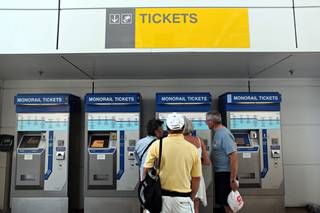Wednesday, May 12, 2010 | 8:58 a.m.
Sun Archives
- Las Vegas Monorail bond insurer loses key ruling (4-26-2010)
- Las Vegas Monorail wants more time in bankruptcy case (4-23-2010)
- RTC to Las Vegas Monorail: You’re on your own (3-11-2010)
- Monorail knew of insolvency for years, files show (2-27-2010)
- Las Vegas Monorail officials thinking beyond crushing debt (2-22-2010)
- Las Vegas Monorail could seek partnership with Chinese (2-17-2010)
- Monorail spending expected to be scrutinized at bankruptcy hearing (2-17-2010)
- Las Vegas Monorail bonds downgraded after bankruptcy filing (2-5-2010)
- Las Vegas Monorail argues against bankruptcy as municipality (2-3-2010)
- After all the promises, will taxpayers be stuck with the monorail’s bills? (1-22-2010)
- Judge sets hearing date in Las Vegas Monorail bankruptcy case (1-19-2010)
- Las Vegas Monorail files for bankruptcy protection (1-13-2010)
The insurer for the Las Vegas Monorail’s bonds is appealing an April 26 bankruptcy court ruling that found the monorail is not a government agency.
Ambac Assurance Corp. of Wisconsin -- which insured the bulk of the $649 million in tax-exempt bonds issued by the state to construct the monorail -- and Wells Fargo Bank had argued that the monorail should not be allowed to proceed under Chapter 11. Their attorneys had demanded the Chapter 11 case be dismissed, arguing that a filing under Chapter 9 reserved for government agencies was more appropriate.
Bankruptcy Judge Bruce Markell in Las Vegas noted in his April ruling that the bond documents clearly say the state is not liable for any bond indebtedness. Markell agreed there has been substantial state involvement with the monorail, but said that involvement doesn't make the monorail a municipality eligible for a Chapter 9 filing.
"No one seriously contends that Las Vegas Monorail Co. is a political subdivision or agency of the state of Nevada. It has no power to tax, no power of eminent domain and no sovereign immunity," Markell wrote in his ruling.
Monday's appeal was filed by Ambac and its regulator, the Office of the Commissioner of Insurance for the State of Wisconsin, which has assumed control of some Ambac contracts.
Ambac attorneys haven't said how a Chapter 9 filing would benefit the insurer, but one observation by observers is that under a Chapter 9, Ambac would have more leverage in the case to protect its interests should monorail assets be sold. And Markell's ruling bolstered the understanding that taxpayers won't have to cover the monorail's losses or the claims of creditors.
"Contrary to the Bankruptcy Court’s ruling, based upon the undisputed facts and applicable legal authorities, the debtor is a municipality under the Bankruptcy Code as an instrumentality of the state of Nevada because it is controlled by the governor of the State of Nevada," Ambac attorneys said in their appeal notice. "Because the debtor is a municipality under the Bankruptcy Code, it is not eligible to be a debtor under Chapter 11.
"To qualify to receive the proceeds of the sales of the tax-exempt governmental bonds, and to protect the state of Nevada from liability for payment on the bonds, the Las Vegas Monorail and the director (of the Department of Business and Industry) executed a tax certificate and agreement under which the Las Vegas Monorail expressly represented that it was an `instrumentality of the state of Nevada' and that it was `controlled by the governor of the state of Nevada,'" the attorneys said in the appeal, which was filed in U.S. District Court in Las Vegas, which is separate from the Bankruptcy Court.
"Not only did the Las Vegas Monorail represent that it was an instrumentality of the state controlled by the governor, the undisputed facts support those representations. The state of Nevada controls major aspects of the monorail's governance, financial affairs and operations. For instance, all appointments to the monorail's board of directors must be approved by the governor," Ambac's filing said.
"In support of its ruling on the controlling question of law, the Bankruptcy Court states, in general fashion and without specific citation, that `the governor’s control, then, while extensive, is not the type of control that historically has caused courts to label entities or enterprises instrumentalities of the state,"' the filing said. "Contrary to this statement, however, the Bankruptcy Court’s ruling has little, if any, case law or statutory support. In fact, the new instrumentality test created by the Bankruptcy Court directly contradicts the congressional intention for the Bankruptcy Code definition of `municipality' to be expansive. Likewise, this new test runs contrary to the relevant case decisions, substantially all of which emphasize the extent of state control, not the purposes of state control, in deciding whether a putative debtor is an instrumentality of the state for bankruptcy-eligibility purposes."
Because of disappointing rider counts, the monorail has never been able to make enough money to cover its debt obligations and filed for bankruptcy reorganization in January. The system, which started operations in 2004 east of the Las Vegas Strip and on Paradise Road, has said that without financial relief through bankruptcy it won’t be able to pay for hundreds of millions of dollars in necessary train and equipment repair and replacement costs.
Last year, the system generated less than $5 million in net cash flow, far short of the $34 million needed to service its debt.


Join the Discussion:
Check this out for a full explanation of our conversion to the LiveFyre commenting system and instructions on how to sign up for an account.
Full comments policy